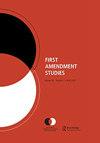伤人的言语,保护的身体:对威斯特布路浸信会仇恨言论的身体反应
Q2 Social Sciences
引用次数: 4
摘要
在接下来的文章中,我认为美国最高法院在斯奈德诉菲尔普斯案中的判决,以及围绕葬礼纠察的象征和空间背景,使社区对仇恨言论的特定反应模式成为可能,也受到了限制。探索社区对威斯特布路浸信会仇恨言论的反应,揭示了一种基于身体存在的抵抗模式,因为反示威者的身体被用来保护哀悼者免受仇恨信息的伤害。这些回应的物质本质重申了公共与私人、神圣与亵渎之间的界限,而司法回应却没有这样做。本文章由计算机程序翻译,如有差异,请以英文原文为准。
Words that wound, bodies that shield: Corporeal responses to Westboro Baptist Church’s hate speech
Abstract In the following essay, I argue that the U.S. Supreme Court decision in Snyder v. Phelps, together with the symbolic and spatial contexts surrounding funeral picketing, enables and constrains particular modes of community response to hate speech. Exploring community responses to Westboro Baptist Church’s hate speech reveals a mode of resistance based in corporeal presence, as counter-demonstrators’ bodies are used to shield mourners from messages of hate. The corporeal nature of these responses reasserts the boundaries between the public and private, and the sacred and profane, in ways that judicial responses do not.
求助全文
通过发布文献求助,成功后即可免费获取论文全文。
去求助
来源期刊

First Amendment Studies
Social Sciences-Law
自引率
0.00%
发文量
0
期刊介绍:
First Amendment Studies publishes original scholarship on all aspects of free speech and embraces the full range of critical, historical, empirical, and descriptive methodologies. First Amendment Studies welcomes scholarship addressing areas including but not limited to: • doctrinal analysis of international and national free speech law and legislation • rhetorical analysis of cases and judicial rhetoric • theoretical and cultural issues related to free speech • the role of free speech in a wide variety of contexts (e.g., organizations, popular culture, traditional and new media).
 求助内容:
求助内容: 应助结果提醒方式:
应助结果提醒方式:


